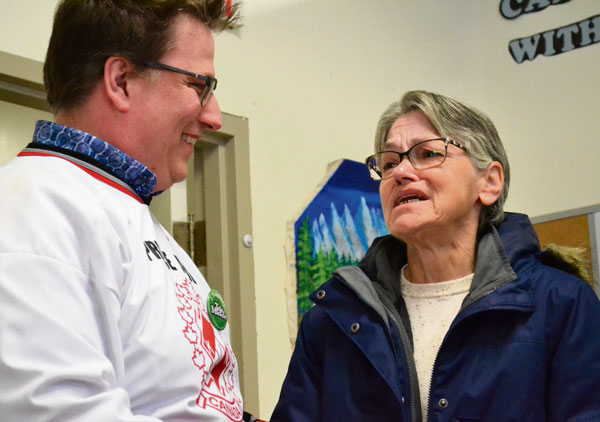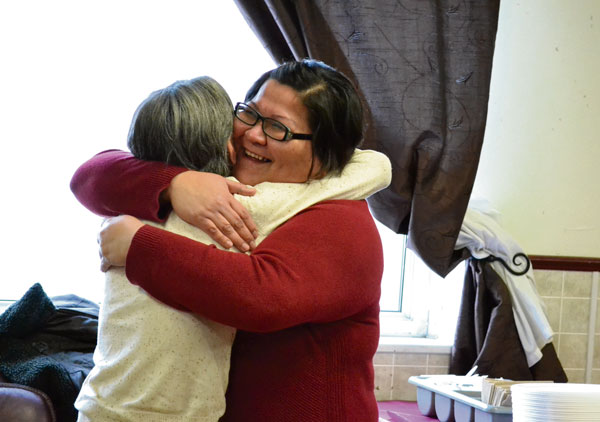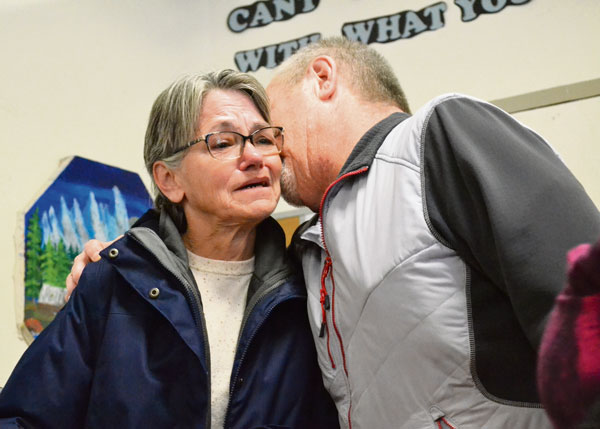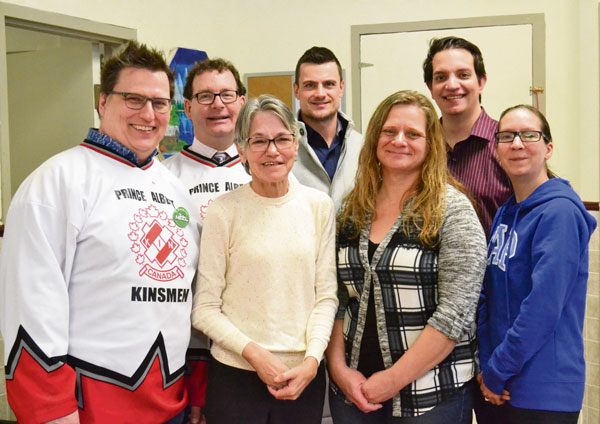
“Janet is very humble. She’s kind, she’s a dedicated person to helping other people. She’s very strong.” – Georgette Arcand
Janet Carriere’s 2019 Citizen of the Year nominator describes her as a strong woman who spreads a powerful message in Prince Albert and beyond.
The annual award is presented by the Kinsmen Club and Daily Herald to a standout citizen for their community contributions. On Monday afternoon, Carriere walked into the Indian and Métis Friendship Centre, where she serves as executive director, surprised and teary-eyed to find out it was her.
Her coworker, Georgette Arcand, nominated her for volunteerism and advocacy for homelessness, addictions and mental health.
Carriere made her way around the room giving hugs to her coworkers, friends and family. She instantly knew it was Arcand who nominated her, joking about how she asked for a list of boards Carriere sits on.

“This is insane. I’ve done nothing to deserve this. I just do what I do and there’s so many people in this community that are so (much) more deserving,” said Carriere. But in her nomination letter, Arcand said that’s why she deserves the award: she does everything from her heart and expects nothing in return.
“Janet is very humble. She’s kind, she’s a dedicated person to helping other people. She’s very strong. Even though she’s very quiet, she’s also got a voice and she will say what she needs to say. She’s a good leader. She doesn’t hesitate to get in and get her hands dirty: washing dishes, cleaning the bathroom, she does everything. That’s just Janet. Janet is a good soul,” said Arcand after the announcement.
Carriere said the Friendship Centre provides “holistic healing” to Indigenous people who are often neglected.
“A lot of the people that deal with addictions and mental health have had doors slammed in their faces all the time, people talking down to them and beating them down,” she said.
“The fact that I enjoy white privilege is wrong, and so we need to change the thinking in our communities so that people are judged by the people that they are, not the colour of the skin or the struggles in their life they’re facing.”
She said staff integrate the Indigenous culture into their programs: “When we’re going to have a healing circle of any sort, we have a set agenda, but we don’t necessarily follow that. The circle goes where it’s meant to go because the Creator will guide it and guide us.”
One of the circles is for men with aggressive tendencies. Carriere said while there’s lots, but still not enough, supports for abused women, there’s nothing to prevent men from being aggressive in the first place.
“If you’re being abused by a man, you can go into a shelter and get the support that you need, but then another woman comes along and fills that spot and she’s abused. We’re trying to change the behaviours of the men so that they’re not abusers anymore, so that they are the protectors and the providers that they were meant to be.”
Additionally, Carriere said she invited the Charlette family for a support circle. She said they’ve received little support since 37-year-old Timothy Charlette went missing in October of 2014.
“When we lift people up, the cost to our community actually lessens. The addictions lessen, the struggles lessen and people can only get it in the dollars and cents value really if they’d invest some time into creating a more equal community. It would save a lot of money, but it would also allow Indigenous people to hold their heads up and be proud again. I just think as a human being that walks with the Creator and the Creator walks with me, I have to. We all have to. We all should and if we all would, what an awesome community we would all have,” said Carriere.

Aside from the Friendship Centre, Carriere is a member of several community boards, including the Board of Police Commissioners, the Community Advisory Board for Homelessness, Prince Albert Community Housing and the Prince Albert Indigenous Coalition. She’s also the president of the Aboriginal Friendship Centres and advisor for the Commemorative Day for Missing and Murdered Women.
Previously, she was a board member of the Prince Albert Food Bank and the Prince Albert Women’s Shelter, as well as an organizer of the RCMP’s Missing and Murdered Indigenous Women Feast and Rounddance.
“She gives and gives all the time,” emphasized Arcand. She’s known Carriere since she was 16 years old working her first job at the Friendship Centre.
She’s been the program director there for the last five years.
Carriere is the 62nd recipient of the Prince Albert Citizen of the Year award. Past recipients include Felix Casavant and Derek Smith, Ron and Shelley Horn, Duane Hayunga, Lyle Karasiuk, Dale McFee, Sheryl Kimbley and Bernice Sayese.
“She probably didn’t know that she would ever get the Citizen of the Year award. She walks alongside Bernice and Sheryl. That’s how I see them all. They’ve all been mentors to me,” said Arcand.
“It’s really a community service project, it’s about honouring and respecting somebody who has made a special contribution to make the community a better place,” added Wes Moore of the Prince Albert Kinsmen Club.
He’s chair of the upcoming Citizen of the Year banquet, which is expected to place at the end of January or beginning of February. Tickets will be available for the public to purchase.

Moore said surprising the recipient is always a special moment.
“I’ve been involved in these for a number of years and it was a really honest expression of emotion that she had. She was genuinely surprised and ultimately very appreciative,” he said.
As a leader at the Friendship Centre since 1999, Carriere said she’s most proud of making life better for Indigenous people.
“We’ve taken a voice to tables and places in our community that weren’t there before—voices for those that don’t have a voice,” she said. “I feel like we’re slowly getting there. I can talk and people actually hear what I have to say.”
“I can’t believe that I received this honour for doing something that we all should be doing every day of our lives.”

